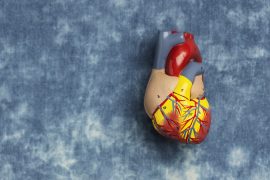World Heart Day is celebrated on 29th September every year, to spread awareness on Cardiovascular Diseases and other heart conditions, while emphasizing the importance of heart health and how to maintain it.
Cardiovascular Diseases (CVDs) are the leading cause of death globally, and claim about 17.9 million lives approximately every year, according to the World Health Organization (WHO). World Heart Day provides an ideal platform for those suffering from CVDs to fight against it and reduce the global burden of the disease.
Created by the World Heart Federation, World Heart Day is a global campaign that informs people about the risk of cardiovascular diseases and highlights the actions one can take to keep heart diseases at bay.
World Heart Day 2021
This year, the theme of World Heart Day is Use Heart to Connect, which urges everyone to use their knowledge, influence, and the power of digital media to connect to the global community and ensure that everyone gets a chance to live a heart-healthy life.
COVID-19 has brought about a drastic change in the world and has posed a serious threat to everyone, making us increasingly aware of the importance to protect our health as well as that of our loved ones. For those living with CVD, COVID-19 has put them in a compromising situation, as they are at a higher risk of contracting the virus.
The goal of World Heart Day 2021 is to harness the power of digital health to improve awareness of the prevention and management of CVD, on a global level, with the help of three key pillars – equity, prevention, and community
Equity:
Due to the lack of internet facilities among half the world’s population, awareness on CVD prevention, treatment, and control are unavailable. It is important to use technology and data to bridge this gap with the use of digital tools and enable better prevention, diagnosis, and treatment of heart-related diseases.
Prevention:
Prevention is better than cure, To maintains a healthy heart, follow a healthy diet, avoid alcohol and tobacco abuse and follow a regular exercise regimen. If you are diagnosed with an underlying health condition such as diabetes, high blood pressure, obesity, or more, ensure regular check-ups with your medical practitioner.
Community:
According to the World Heart Federation, over 520 million people are living with CVD across the globe, and have been severely affected due to the COVID-19 pandemic, as they are highly prone to the infection, and have to be isolated. This has resulted in missing medical follow-ups and appointments, lack of contact with people, and reduced exercise. Through digital networks, those who are vulnerable can easily connect with their families, friends, and even doctors for support.
What are Cardiovascular Diseases (CVDs)?
Cardiovascular Diseases (CVDs) refer to the set of conditions that affect the functioning of the heart and blood vessels such as:
Arrhythmia:
Arrhythmias refers to abnormal heart rhythms. In this condition, the heart either beats too slow or too fast. Bradycardia occurs when the heart rate is too slow (less than 60 beats per minute) and Tachycardia occurs when the heart rate is too fast (more than 60 beats per minute). When an arrhythmia occurs, the heart may not be able to pump enough blood required by the body.
Aortic Disease:
Aorta is the large artery through which oxygen-rich blood flows to the rest of the body. Sometimes, the aorta may widen or tear, which leads to a condition called Atherosclerosis. This condition develops when plaque builds up in the walls of the arteries, making blood flow difficult. This may even lead to a heart attack or stroke.
Heart Attack:
This occurs when blood flow to a part of the heart is blocked by a blood clot, leading to a lack of oxygen.
What are the risk factors of CVDs?
Some of the major risk factors of Cardiovascular Disease include:
- High cholesterol levels
- Diabetes
- Lack of physical activity
- Tobacco consumption
- COVID-19



How can you prevent Cardiovascular Diseases?
There are several risk factors associated with CVDs such as the family history of heart diseases, that cannot be prevented or helped. However, certain risk factors such as high blood pressure, diabetes, cholesterol levels can be treated on time, reducing the risk of CVDs. If you are a frequent consumer of tobacco and alcohol, reducing the consumption of these can also help prevent heart diseases. It is also important to make several lifestyle changes such as a regular physical activity routine and incorporating a healthy diet, which will also help keep heart diseases at bay.
Some tips to keep the heart healthy
Now that we know the importance of keeping the heart healthy and how CVDs can affect our health drastically, here are some tips one can follow to ensure that the heart remains in a good shape. They are:
Eat Healthy: Avoid foods that are extremely rich in fat content, and eat fiber-rich foods. Also, make sure that you eat in moderation.
Get Active: It is also important to have a regular exercise routine and stay physically active. Also incorporate regular movement if your job requires you to sit at a desk for long hours, and maintain a healthy weight.
Quit Smoking: It is a well-known fact that smoking is one of the main causes and risk factors of heart disease. If you are a regular smoker, quit smoking immediately and avoid the risk of CVD.
Overall, it is extremely necessary to maintain your health and go for regular follow-ups if you have underlying conditions such as diabetes or high blood pressure. Though there are several treatment methods for different types of heart diseases, making certain lifestyle changes will ensure that you don’t develop the risk of CVDs at all. Remember, prevention is always better than cure!





Comments are closed.